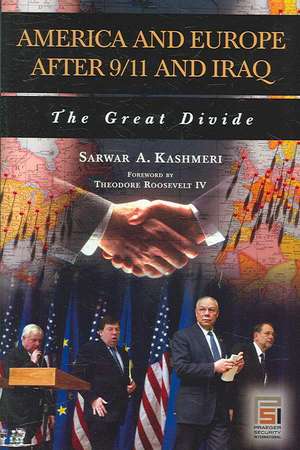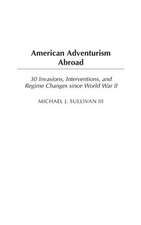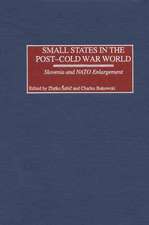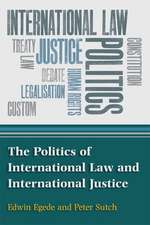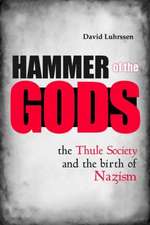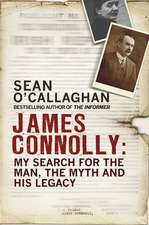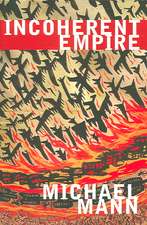America and Europe after 9/11 and Iraq: The Great Divide: Praeger Security International
Autor Sarwar A. Kashmerien Limba Engleză Hardback – 29 noi 2006 – vârsta până la 17 ani
| Toate formatele și edițiile | Preț | Express |
|---|---|---|
| Paperback (1) | 107.00 lei 3-5 săpt. | |
| Potomac Books Inc – 31 iul 2008 | 107.00 lei 3-5 săpt. | |
| Hardback (1) | 352.96 lei 6-8 săpt. | |
| Bloomsbury Publishing – 29 noi 2006 | 352.96 lei 6-8 săpt. |
Din seria Praeger Security International
- 18%
 Preț: 334.19 lei
Preț: 334.19 lei - 8%
 Preț: 335.53 lei
Preț: 335.53 lei - 34%
 Preț: 376.10 lei
Preț: 376.10 lei - 46%
 Preț: 443.64 lei
Preț: 443.64 lei - 29%
 Preț: 240.11 lei
Preț: 240.11 lei - 8%
 Preț: 304.56 lei
Preț: 304.56 lei - 34%
 Preț: 373.82 lei
Preț: 373.82 lei - 19%
 Preț: 412.79 lei
Preț: 412.79 lei - 19%
 Preț: 338.42 lei
Preț: 338.42 lei - 18%
 Preț: 335.62 lei
Preț: 335.62 lei - 27%
 Preț: 377.35 lei
Preț: 377.35 lei - 27%
 Preț: 376.75 lei
Preț: 376.75 lei - 18%
 Preț: 336.46 lei
Preț: 336.46 lei - 18%
 Preț: 321.73 lei
Preț: 321.73 lei - 27%
 Preț: 384.51 lei
Preț: 384.51 lei - 18%
 Preț: 320.50 lei
Preț: 320.50 lei - 18%
 Preț: 320.50 lei
Preț: 320.50 lei - 18%
 Preț: 321.35 lei
Preț: 321.35 lei - 24%
 Preț: 420.54 lei
Preț: 420.54 lei - 14%
 Preț: 335.99 lei
Preț: 335.99 lei - 18%
 Preț: 355.82 lei
Preț: 355.82 lei - 18%
 Preț: 319.83 lei
Preț: 319.83 lei - 18%
 Preț: 334.28 lei
Preț: 334.28 lei - 32%
 Preț: 354.48 lei
Preț: 354.48 lei - 14%
 Preț: 335.14 lei
Preț: 335.14 lei - 38%
 Preț: 405.98 lei
Preț: 405.98 lei - 40%
 Preț: 571.34 lei
Preț: 571.34 lei - 18%
 Preț: 321.85 lei
Preț: 321.85 lei - 18%
 Preț: 323.25 lei
Preț: 323.25 lei - 18%
 Preț: 253.28 lei
Preț: 253.28 lei - 40%
 Preț: 571.50 lei
Preț: 571.50 lei - 14%
 Preț: 333.72 lei
Preț: 333.72 lei - 18%
 Preț: 301.73 lei
Preț: 301.73 lei - 26%
 Preț: 387.80 lei
Preț: 387.80 lei - 18%
 Preț: 302.77 lei
Preț: 302.77 lei - 14%
 Preț: 333.91 lei
Preț: 333.91 lei - 17%
 Preț: 325.80 lei
Preț: 325.80 lei - 24%
 Preț: 338.58 lei
Preț: 338.58 lei - 34%
 Preț: 414.73 lei
Preț: 414.73 lei - 18%
 Preț: 354.30 lei
Preț: 354.30 lei - 29%
 Preț: 254.29 lei
Preț: 254.29 lei - 18%
 Preț: 354.11 lei
Preț: 354.11 lei - 18%
 Preț: 334.38 lei
Preț: 334.38 lei - 14%
 Preț: 302.68 lei
Preț: 302.68 lei - 18%
 Preț: 322.97 lei
Preț: 322.97 lei - 27%
 Preț: 376.50 lei
Preț: 376.50 lei - 27%
 Preț: 322.81 lei
Preț: 322.81 lei - 27%
 Preț: 382.91 lei
Preț: 382.91 lei - 18%
 Preț: 320.87 lei
Preț: 320.87 lei
Preț: 352.96 lei
Preț vechi: 433.13 lei
-19% Nou
Puncte Express: 529
Preț estimativ în valută:
67.54€ • 70.52$ • 55.90£
67.54€ • 70.52$ • 55.90£
Carte tipărită la comandă
Livrare economică 04-18 aprilie
Preluare comenzi: 021 569.72.76
Specificații
ISBN-13: 9780275993016
ISBN-10: 0275993019
Pagini: 152
Dimensiuni: 156 x 235 x 18 mm
Greutate: 0.38 kg
Ediția:New.
Editura: Bloomsbury Publishing
Colecția Praeger
Seria Praeger Security International
Locul publicării:New York, United States
ISBN-10: 0275993019
Pagini: 152
Dimensiuni: 156 x 235 x 18 mm
Greutate: 0.38 kg
Ediția:New.
Editura: Bloomsbury Publishing
Colecția Praeger
Seria Praeger Security International
Locul publicării:New York, United States
Notă biografică
Sarwar A. Kashmeri has been recognized on both sides of the Atlantic as an observer and commentator on U.S.-European business and foreign policy issues since 1995. He is a Fellow of the Foreign Policy Association, for which he produces Global Currents, a bimonthly MP3 podcast, interviewing government and corporate leaders on foreign policy and business/public policy issues. He is a strategic communications adviser and business columnist, and divides his time between his Reading, Vermont, residence and New York.
Recenzii
Kashmeri, a fellow at the bipartisan Foreign Policy Association, strongly argues for the necessity of revitalizing the US-European Union political and strategic relationship to match their continuing economic relationship. His central argument is that the actions of neoconservatives, and in particular the George W. Bush administration, have through both hubris and ineptitude done great harm--though at this point not irreparable damage--to this relationship..Recommended. All readership levels.
[T]he author argues a new dialogue between the United States and the EU, especially important because of their common interest in fighting terrorism. He emphasizes how important it is for the United States to end its special relationship with Great Britain, symbolized in the partnership between Bush and former Prime Minister Tony Blair.
Much ink has been spilt regarding the differences between Europe and the United States over the Iraq war and Kashmeri, like many others, sees the split as having roots in the changing transatlantic relationship. Basing part of his analysis on interviews with such figures as George H. W. Bush, Gen. Wesley Clark, former UK Prime Minister John Major, former US Secretary of Defense Caspar Weinberger, and former Spanish Foreign Minister Ana de Palacio, he argues that the Atlantic alliance has grown rotten and that the US needs a fresh approach that moves away from the tilt towards Britain and instead forges a special relationship with Europe as a whole and promotes multilateralism.
The alliance between Europe and America is dead, commentator Sarwar Kashmeri maintains: it can't be fixed, and it must be renegotiated: that's the message of a title which considers different foreign policy priorities between the U.S. and Europe since 9/11, and divisions which grow ever greater as the years go by. America's trouble is that it's using Cold War strategies which are outdated in trying to handle changing European Union priorities and America and Europe After 9/11 and Iraq: The Great Divide charts these differences and offers foreign policy ideas which vastly revamp the relationships between the U.S. and the Union. Perfect for college-level libraries strong in international politics.
This slim volume punches well above its weight. Sarwar Kashmeri is steeped in the history of the last half-century of both European Union and transatlantic affairs, has reflected deeply on both, and has come up with an analysis that more resembles the elegant use of the stiletto than the crude swings of a pugilist..The recipe presented in the book to heal the transatlantic rift avoids the twin perils of trying to identify and redefine the common values shared by the two sides and offering prescriptions for revamping institutions.
Kashmeri explains his perceptions of the sources of friction well, deftly interspersing his interviewees' comments to bolster his argument (the rather jolting candor of some comments, considering their sources, is a high point of the book).
A leading national voice on European integration, and business policy, Kashmeri outlines the need for a new U.S./European Union alliance which will make America and the world a safer place, and repudiates the prevailing neoconservative view that a weakened European Union would benefit American interests at home and abroad. Despite the United States' diplomatically disastrous invasion of Iraq, Kashmeri describes realistic strategies to successfully achieve a new U.S./EU alliance and how such an alliance might salvage the unfolding quagmire in Iraq, and confront the worldwide roots of terrorism.
[T]he author argues a new dialogue between the United States and the EU, especially important because of their common interest in fighting terrorism. He emphasizes how important it is for the United States to end its special relationship with Great Britain, symbolized in the partnership between Bush and former Prime Minister Tony Blair.
Much ink has been spilt regarding the differences between Europe and the United States over the Iraq war and Kashmeri, like many others, sees the split as having roots in the changing transatlantic relationship. Basing part of his analysis on interviews with such figures as George H. W. Bush, Gen. Wesley Clark, former UK Prime Minister John Major, former US Secretary of Defense Caspar Weinberger, and former Spanish Foreign Minister Ana de Palacio, he argues that the Atlantic alliance has grown rotten and that the US needs a fresh approach that moves away from the tilt towards Britain and instead forges a special relationship with Europe as a whole and promotes multilateralism.
The alliance between Europe and America is dead, commentator Sarwar Kashmeri maintains: it can't be fixed, and it must be renegotiated: that's the message of a title which considers different foreign policy priorities between the U.S. and Europe since 9/11, and divisions which grow ever greater as the years go by. America's trouble is that it's using Cold War strategies which are outdated in trying to handle changing European Union priorities and America and Europe After 9/11 and Iraq: The Great Divide charts these differences and offers foreign policy ideas which vastly revamp the relationships between the U.S. and the Union. Perfect for college-level libraries strong in international politics.
This slim volume punches well above its weight. Sarwar Kashmeri is steeped in the history of the last half-century of both European Union and transatlantic affairs, has reflected deeply on both, and has come up with an analysis that more resembles the elegant use of the stiletto than the crude swings of a pugilist..The recipe presented in the book to heal the transatlantic rift avoids the twin perils of trying to identify and redefine the common values shared by the two sides and offering prescriptions for revamping institutions.
Kashmeri explains his perceptions of the sources of friction well, deftly interspersing his interviewees' comments to bolster his argument (the rather jolting candor of some comments, considering their sources, is a high point of the book).
A leading national voice on European integration, and business policy, Kashmeri outlines the need for a new U.S./European Union alliance which will make America and the world a safer place, and repudiates the prevailing neoconservative view that a weakened European Union would benefit American interests at home and abroad. Despite the United States' diplomatically disastrous invasion of Iraq, Kashmeri describes realistic strategies to successfully achieve a new U.S./EU alliance and how such an alliance might salvage the unfolding quagmire in Iraq, and confront the worldwide roots of terrorism.
